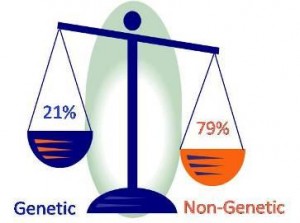 By Dr Ed Taubman, Olney Md 301-774-5400
By Dr Ed Taubman, Olney Md 301-774-5400
With genetic causes of cancer in the general population proving elusive, our focus is increasingly moving towards lifestyle contributions. Increasingly obesity, poor nutrition choices, lack of exercise and alcohol use are being linked to cancer risks. Some experts feel that 1 in 3 cancers in the United States is linked to the above lifestyle issues. Worldwide smoking remains the number one contributor to cancer; but in the United States, as fewer and fewer people smoke and more and more people become overweight, the trend at home has made obesity the number one contributor. And how about alcohol? Alcohol has been declared a carcinogen by the International Association of Research in Cancer. Its breakdown products include 15 known carcinogens from arsenic to formaldehyde. A recent study in the American Journal of Public Health estimated that about 1 in 30 cancer deaths in the United States can be linked to alcohol. Alcohol can raise estrogen levels, and studies have linked three or four drinks a day to increases in breast cancer risk by 40-50%. But surely small amounts of alcohol are okay? Unfortunately, when it comes to cancer, evidence seems to be accumulating that the more one drinks, the greater the risk and that likely there is no amount of alcohol that is safe. Just one drink a day is thought to increase breast cancer risk by about 4%.
So what does the public think about lifestyle change to prevent cancer? In one recently published study 1700 women were asked if they were interested in learning about lifestyle changes to reduce their risk of breast cancer. Of the respondents 41% were interested in learning more about how exercise could reduce their risk, 35% for weight loss, 30% by diet and only 12% were interested in learning about reducing alcohol consumption to cut their risk. Why the disconnect with alcohol? Perhaps it is because alcohol use is so woven into our society as a fun thing to do and its cardiovascular benefits have long been touted. However, for those worried about their cancer risk, lifestyle changes including reducing alcohol consumption to a minimum, becoming more vegetarian, losing weight and exercising seem reasonable and prudent.
